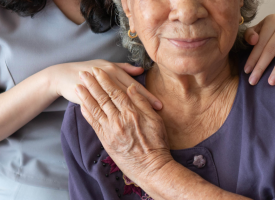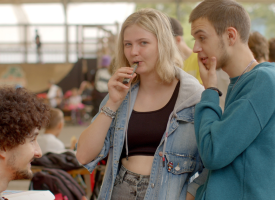Transcript - Dr Gannon - RN Drive - Asylum Seekers on Manus Island
Transcript: AMA President Dr Michael Gannon, RN Drive with Patricia Karvelas, Tuesday 21 November 2017
Subject: Asylum Seekers on Manus Island
PATRICIA KARVELAS: Conditions appear to be deteriorating rapidly for the several hundred asylum seekers who remain at the Manus Island detention centre. Water and power have been cut off. There's no food, and medical supplies have run out. A video filmed last week by asylum seekers on Manus, and published by Fairfax Media, shows filthy blocked toilets, and men with skin infections. Here's some of that audio.
[Excerpt]
UNIDENTIFIED SPEAKER: A lot of men are taking medication, which is antidepressants and sleeping tablets, and they are all gone now. Some of them, now what they are doing, they are trying to- what do we call, like taking coffee just to- kind of drugging themselves with a lot of coffee. It's like 20 cups of coffee a day, 25, without sugar, sometimes 30, and they don't sleep [indistinct]. I know a couple of guys, they haven't slept for a week.
[End of excerpt]
PATRICIA KARVELAS: The Australian Medical Association has written twice to the Immigration Minister Peter Dutton requesting access to the facility to assess the men. The AMA's President is Dr Michael Gannon. Welcome back to RN Drive.
MICHAEL GANNON: Good evening, Patricia.
PATRICIA KARVELAS: This video posted online shows pretty filthy conditions – blocked toilets, there's no clean water, medications have run out. Given we have some of the details of the situation these men are in, what impact will these conditions have on the remaining men, in your assessment?
MICHAEL GANNON: Well, it's potentially a recipe for disaster. If they don't have access to clean ablutions facilities, clean water to wash, adequate hydration – remembering we're talking about the tropics – adequate nutrition, access to prescribed medication, and access to medical care for injuries or any deterioration in their health, then something's inevitably going to go wrong eventually.
PATRICIA KARVELAS: There have been concerns about a potential outbreak of cholera. How serious could that be?
MICHAEL GANNON: Well, cholera is a very serious condition, and if you don't have access to clean water to prepare food in, to drink, if you've got unsafe toilet facilities or no facilities at all, then infections like this will take hold. There's an even higher risk if we're talking about people who are vulnerable because of malnutrition. Those sort of things can take hold more quickly in environments like the tropics that we're talking about when we talk about Manus Island.
PATRICIA KARVELAS: Men who have run out of antidepressants have also apparently been self-medicating, and we heard some of that in that clip from Fairfax Media – lots of coffee, for instance, not sleeping for a whole week. Given they're already under pretty severe mental strain in those conditions, what happens when people do that to their bodies?
MICHAEL GANNON: Well, we worry about the deterioration in the mental health conditions of many of the men. We know that they're already present. We worry that there'll be an exacerbation of those conditions where they do already exist, and the great uncertainty that these men have in their lives – and have had in their lives for some period of time – is fertile ground for significant mental health problems. If they've been prescribed medication and they're not taking it, well, then they're at risk of getting worse and that could have tragic consequences.
PATRICIA KARVELAS: Well, this is a case of not even having access to those antidepressants, not making an active choice.
MICHAEL GANNON: That's exactly right, and these are some of the reports we're hearing. And that's the basis of our call for transparency around the health care and accommodation arrangements for these men.
PATRICIA KARVELAS: In the video, one asylum seeker says they've repeatedly asked for a doctor or a nurse to assess the asylum seekers but that hasn't happened. What do you know?
MICHAEL GANNON: Well, we don't know enough. That's the very simple answer. From time to time, we hear reassurance from the authorities that adequate care is available. I would like to hear an independent assessment of exactly what healthcare facilities are available in the second centre where they're encouraging the men to move. We need to get a better idea of what's going on inside this facility.
We've been calling for some time now for transparency in these arrangements. We used to have some form of communication channel when Dr John Brayley was the Chief Medical Officer of the Department of Immigration and Border Protection. There was regular communication between my office and his office, he and I would talk from time to time. Since his resignation, we've lost a lot of those communication channels.
Very simply, the Federal Council of the AMA passed a unanimous resolution over the weekend calling for transparency so we can independently make our judgements about the quality of health care these men are receiving.
PATRICIA KARVELAS: Now, I began this story telling our listeners that you'd written to the Immigration Minister Peter Dutton twice, requesting access for Australian doctors to Manus. Have you had any response or dialogue from him?
MICHAEL GANNON: There has been communication between my office in Canberra and the Department of Immigration and Border Protection. I'm hopeful there'll be an opportunity to meet with the Minister when I'm in Canberra next week.
We see this very much that there's an opportunity for the AMA to use its unique position, its unique network of doctor members across the country with the appropriate level of expertise. We can help the Australian Government, we can help the men in his wretched situation. There's no other organisation that knows who does have the expertise as a psychiatrist, who does have the expertise as an infectious diseases physician, who does have the expertise as a GP to go up there and make a genuinely independent assessment of the conditions these men are in.
PATRICIA KARVELAS: So that's your case, and you're going to put that to the Immigration Minister if you get a chance to meet him, but what levers do you have? What power do you have? How can you try and force the Government's hand in this area? Because so far they have been unwilling to acquiesce to your request.
MICHAEL GANNON: Well, we're in no position to demand anything of Governments. We're in no position to insist on anything. Every day of the week we're advocating for better health of Australian citizens in Australia; those calls are not always heeded.
This group of men enjoys the same protection under Australian law. We have the same commitment to them under very clear ethical principles. But, very simply, in our job you don't always get everything you want. But one thing the Government can be sure of is that we will continue to make the case for not only these men, but anyone who lacks appropriate access to appropriate standards of health care.
PATRICIA KARVELAS: In your view, does Australia still have a duty of care to provide these men with medical assistance?
MICHAEL GANNON: Unequivocally under international law, and unequivocally do we as doctors have a responsibility to speak out for them. These are principles of international law. Our call for transparency in healthcare arrangements is very much in line with both World Medical Association and Australian Medical Association policies, which refer to the need to provide appropriate levels of health care to asylum seekers, refugees, or even those who are deemed not to be refugees. These men remain the responsibility of the Australian Government.
PATRICIA KARVELAS: Thank you so much for your time, Dr Gannon.
MICHAEL GANNON: Pleasure, Patricia.
PATRICIA KARVELAS: That's the President of the Australian Medical Association, Dr Michael Gannon, and the AMA are pushing for access for Australian doctors to have access to these men on Manus Island and are requesting a meeting also with the Immigration Minister Peter Dutton.
21 November 2017
CONTACT: John Flannery 02 6270 5477 / 0419 494 761
Maria Hawthorne 02 6270 5478 / 0427 209 753
Follow the AMA Media on Twitter: http://twitter.com/ama_media
Follow the AMA President on Twitter: http://twitter.com/amapresident
Follow Australian Medicine on Twitter: https://twitter.com/amaausmed
Like the AMA on Facebook https://www.facebook.com/AustralianMedicalAssociation



